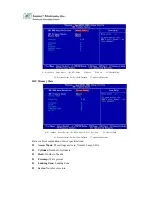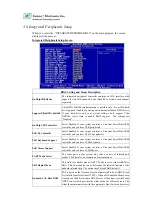
3.8 PCI Plug and Play Setup
Both the ISA and PCI buses on the CPU card use system IRQs & DMAs. You must set up the
IRQ and DMA assignments correctly through the PnP/PCI Configuration Setup utility,
otherwise the motherboard will not work properly.
PnP/PCI Configuration Setup Screen
BIOS Setting and Terms Description
PnP OS Installed
Select “Yes” if you are using a Plug and Play capable operating system. Select
“NO” if you need the BIOS to configure non-boot devices
Reset Configuration
Data
Normally, you leave this field “Disabled”, Select “Enabled” to reset Extended
System Configuration Data (ESCD) when you exit Setup if you have installed a
new add-on and the system reconfiguration has caused such a serious conflict that
the operating system cannot boot.
Resource Controlled
By
The Award Plug and Play BIOS has the capacity to automatically configure all of
the boot and Plug and Play compatible devices. However, this capability means
absolutely nothing unless you are using a Plug and Play operating system such as
Windows
®
98. If you set this field to “Manual” choose specific resources by
going into each of the sub menu that follows this field ( a sub menu is proceded
by a “
►
”). The settings are “Auto(ESCD)”, “Manual”.
IRQ Resources
When resources are controlled manually, assign each system interrupt as one of
the following types, depending on the type of device using the interrupt.
IRQ3/4/5/7/9/10/11/12/14/15:
These items specify the bus where the specified IRQ line is used. The settings
determine if Award BIOS should remove an IRQ from the pool of available IRQs
passed to devices that are configurable by the system BIOS. The available IRQ
pool is determined by reading the ESCD NVRAM. If more IRQs must be
removed from the IRQ pool, the end user can use these settings to reserve the IRQ
by assigning an ISA/EISA setting to it. Onboard I/O is configures by Award
BIOS. All IRQs used by onboard I/O are configured as PCI/PnP. If all IRQs are



































